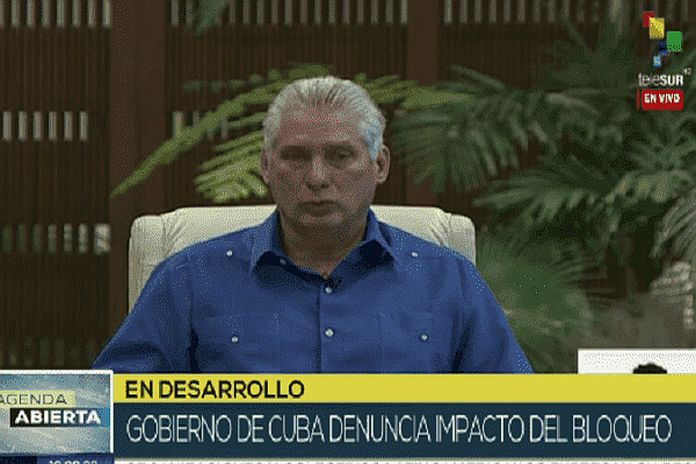HAVANA, Cuba, (Telesur) – On Monday, Cuba’s president Miguel Diaz-Canel addressed the nation to analyze the actions of those trying to destabilize the Revolution by taking advantage of the crisis prompted by the US blockade and the new COVID-19 wave.
Accompanied by his cabinet, the president reviewed the country’s current epidemiological and economic situation, which the international campaign against the Revolution does not usually mention or even explain.
Besides pointing out that most of the people who took to the streets are not against the revolution but have legitimate dissatisfactions or doubts, he emphasized once again that the blockade has limited the Cuban government’s ability to acquire all the medicines that the people require.
In the short term, the arbitrary actions of the United States have prevented Cuba from accessing almost US$2 billion that would be required to acquire medical supplies.
Energy minister Livan Arronte explained that engineers are working uninterruptedly to solve problems in a thermoelectric generation. He mentioned that the situation is tense due to limitations in acquiring spare parts, technology, and fuel for daily operations.
As a result, the continuous supply of electricity has been noticeably affected since June 21, especially due to the increase in demand during peak hours at night. Notwithstanding the above, technicians continue to work intensively to make adjustments to the national power system.
In 2019, when the Helms-Burton Act began to be applied, Diaz-Canel, who is an electrical engineer, informed the country would face new difficulties.
“At that time the sanctions policy was focused on boycotting the entry of fuel to Cuba. What was our decision? To protect electricity production for households. […] For over 18 months, we have been without blackouts except for the ones that occurred these days,” he stressed. “We have a thermal generation that works with Cuban crude. […] However, when you don’t have fuel promptly, you overload the generation system,” he added.
Diaz-Canel also explained that the recent blackouts took on new characteristics due to the pandemic because authorities had to set up hotels as hospitals.
“To avoid inconveniencing COVID patients, we have had to protect more circuits, which causes misunderstandings in the population. […] In the midst of all this, we are making new investments. […] Today, although there are some prospects for improvement, we have to consider saving as much as we can in both the residential sector and the public sector.”
Regarding the epidemiological situation in the country, health minister Jose Portal explained that everyone’s cooperation is necessary to fight the pandemic even more efficiently.
“The people must be aware of this. We cannot throw away the sacrifice we have made so far,” he said, adding that the public sector will continue to work tirelessly to protect the lives of Cubans. “We must continue to applaud our doctors because their workload has multiplied and they continue to face the pandemic by putting the lives of Cubans ahead of their own,” Diaz-Canel commented.
Prime minister Manuel Marrero also informed that the government is making epidemiological decisions based on the most recent evidence of the evolution of contagions. To this end, information systems have been improved and seven task forces with experts have been implemented. This is all part of a plan for fighting COVID-19 that changes as the pandemic evolves.
On Sunday, Diaz-Canel toured the San Antonio de Los Baños town, in the province of Artemisa, one of the sites where there were concentrations of people who made various claims. Besides referring to the media campaign organized from abroad to generate chaos on the island, he said that some confused citizens participated in those actions while others had legitimate concerns and doubts.
“There’s a group of counter-revolutionary, mercenary people paid by the US government, paid indirectly through agencies of the US government, to assemble these types of demonstrations,” Diaz-Canel denounced.
Simultaneously, hundreds of Cubans responded to the instigations made through social networks by taking to the streets to express their support to the Revolution in several cities of the country.
On Monday, Cuba’s foreign affairs minister Bruno Rodriguez harshly criticized the statements made by the White House National Security Advisor Jake Sullivan on the internal affairs of the Caribbean country.
“His government has allocated hundreds of millions of dollars for subversion in our country and imposes a genocidal blockade, which is the main cause of economic deficiencies,” Rodriguez said and ratified that freedom of expression and assembly are fully respected in Cuba.





